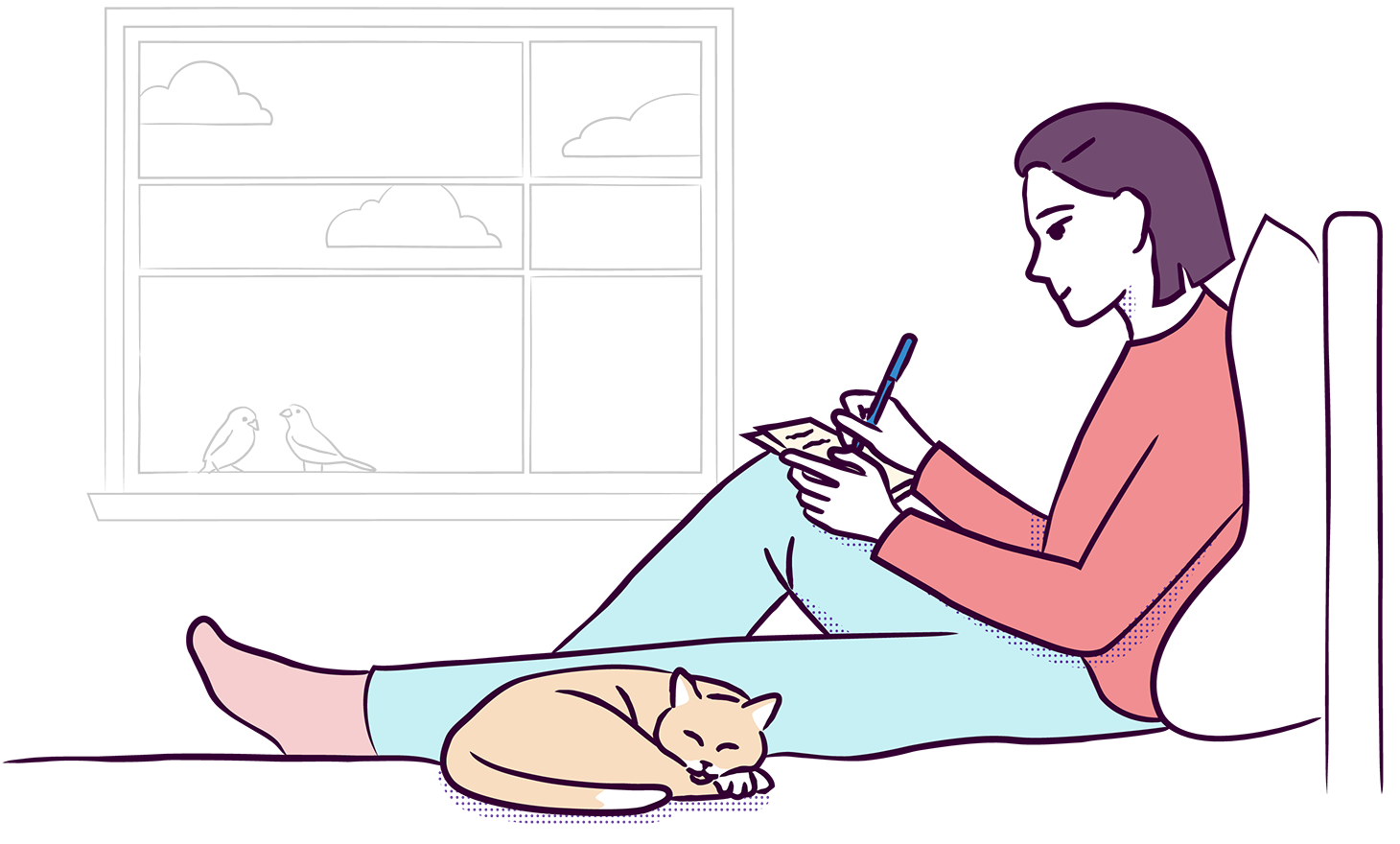
Understanding feelings of sadness

Everyone feels sad sometimes. Sadness can have many different causes, and it can impact you in different ways, emotionally and physically.
When you’re sad, you may experience things like trouble sleeping, loss of appetite, or headaches. You may find that you’re crying a lot, getting grumpy or irritable with the people around you, wanting to be alone all the time, or only wanting to listen to sad songs. All these reactions and ways of feeling sad are normal and often help you to process the sadness.
On this page, you'll find services that can help you with what you're going through, plus helpful information around understanding and managing sadness.

Are you struggling to cope?
If you’ve reached a point where you can’t deal with the sadness or feel like there’s no way out, you can reach out for support.
Services that can help
If you need some support, or aren't sure where to start, there are a few options available:
- Try the Head to Health quiz. It can help you understand what you're experiencing and point you to suitable services and resources.
- Call Head to Health for free on 1800 595 212 for mental health information and referral.
- Try one of the services listed below. There is a wide range of options, no matter the kind of support you’re looking for. You can choose which suits you best.

What causes sadness
Sadness is a common response to painful or distressing situations. This could be the end of a relationship, the death of a loved one, having trouble at school or at home, caring for someone, having an illness, or going through a big life change that involves starting over.
Feeling sad is a good prompt that something might not be quite right. It can motivate you to address the issues contributing to the sadness and help you refocus your priorities. It can also be a signal to those around you that you need help and support.
Grief is a natural response to loss. Loss comes in all forms: the death of a loved one, going through a break-up, or losing a job, to name a few. Grief is much more intense and complex than sadness. Everyone experiences grief in different ways, and its impact can often be longer-lasting. You may not be able to forget the loss, but you can find ways to live with it.
If you’re experiencing grief and need to talk to someone, or just need some support to help you heal, there are many grief counselling and support options available.
You might be at a stage in your life where you're often bored, not satisfied with any of your relationships, unfulfilled at your job, or generally lacking a sense of purpose. You may not be able to enjoy any of the things you used to, and you may even isolate yourself from family, friends, and loved ones. This isolation and emptiness can not only lead to sadness, but also contribute to depression and anxiety, if not managed early.
If you’re struggling to find a sense of purpose, there are steps you can take. Learn more about purposeful activity and get tips on how to bring meaning and joy back into your life.
When does sadness become a problem?
Sadness itself is not a problem or feeling to avoid. It is temporary and can range from mild to intense, but it usually lessens with time. It can also occur alongside positive emotions such as happiness or excitement. But when you start feeling down for longer periods of time (more than 2 weeks) and your mood starts to seriously impact your life and how you function, it can be a problem.
A few signs that you might need to seek support are:
- feeling sad and hopeless most or all of the time
- losing interest in your regular hobbies or activities
- sleeping more or less than usual
- losing your appetite or changing your eating habits
- feeling constantly restless or sluggish
- feeling worthless or like a failure.
Is it sadness, depression, or something else?
If your sadness feels constant, unpredictable, or overwhelming, it may be related to a more serious underlying mental health condition. Persistent feelings of hopelessness and emptiness, for example, are often related to depression. Physical health issues such as chronic pain and illness can also impact your mood and mental health.
Learn more about mental health conditions and disorders.

Reaching out for help
If you’re concerned about your symptoms, or you’re finding it hard to manage, talk to your GP. If you don’t have one, you can use our Find a GP tool.
Coping with sadness
Understanding how to deal with sadness will allow you to process your emotions in a healthy way. There are constructive things you can do to cope.
Denying or ignoring your feelings can make things worse and impact your wellbeing. Plan time for yourself to observe and process your thoughts and feelings. Have a cry, listen to sad songs, do whatever helps you experience your emotions in a healthy way.
Whether it’s writing in your journal or just a few pages that you decide to share with loved ones or throw away, writing can help you explore your feelings. It can often help you identify and work through what's causing your sadness. You can even consider starting a gratitude journal. Focusing on the things you're grateful for can give you hope and help you move away from negative thoughts and feelings.
Sometimes taking a walk or just being outdoors can help you clear your head or change your perspective. It can also help promote feelings you want to experience more of, such as happiness and peace.
It’s normal to have feelings of sadness, joy, anger, happiness all at the same time or to go from one to the other. When that happens, you might not feel like being social or doing your usual activities, but these activities can offer you moments of joy and a break from sadness. It could be physical activity, connecting with people, or spending time on a hobby.
If you’re comfortable doing it, talking about your emotions can help you process them. Whether it’s a family member, friend, partner, or even a coworker, sharing in a safe space can help you to work through your feelings. We have helpful tips on how to start the conversation.
Emotions can happen as a response to another emotion. You may feel embarrassed about feeling sad. This is a common experience. Remember that it's okay to feel sad, and let yourself experience it your own way. Do whatever you need to do to feel better, whether it’s having a long nap or a hot bath, watching your favourite movie, or playing with your pet.
Remember that sadness is often a result of a change you weren’t expecting or a hope that wasn’t fulfilled. While it can be stressful, it’s an important and unavoidable part of living. It can remind you of what’s important to you and what makes you happy, and it can be an opportunity for learning and growth.
You can't control everything that happens in your life, but there are things you can do to get through tough times. Learn more about coping with unexpected life events.

Supporting someone else
It can be hard seeing someone you care about going through a tough time. If you're worried about them, it’s important to let them know. Check in and see how they're doing. Knowing you care about them might be all they need, or they might need your support to get help. If you're not sure where to start, we have helpful tips on practical things you can do to support someone.

Looking for more information and services?
You can browse a wider range of resources on Head to Health with our search tool.

